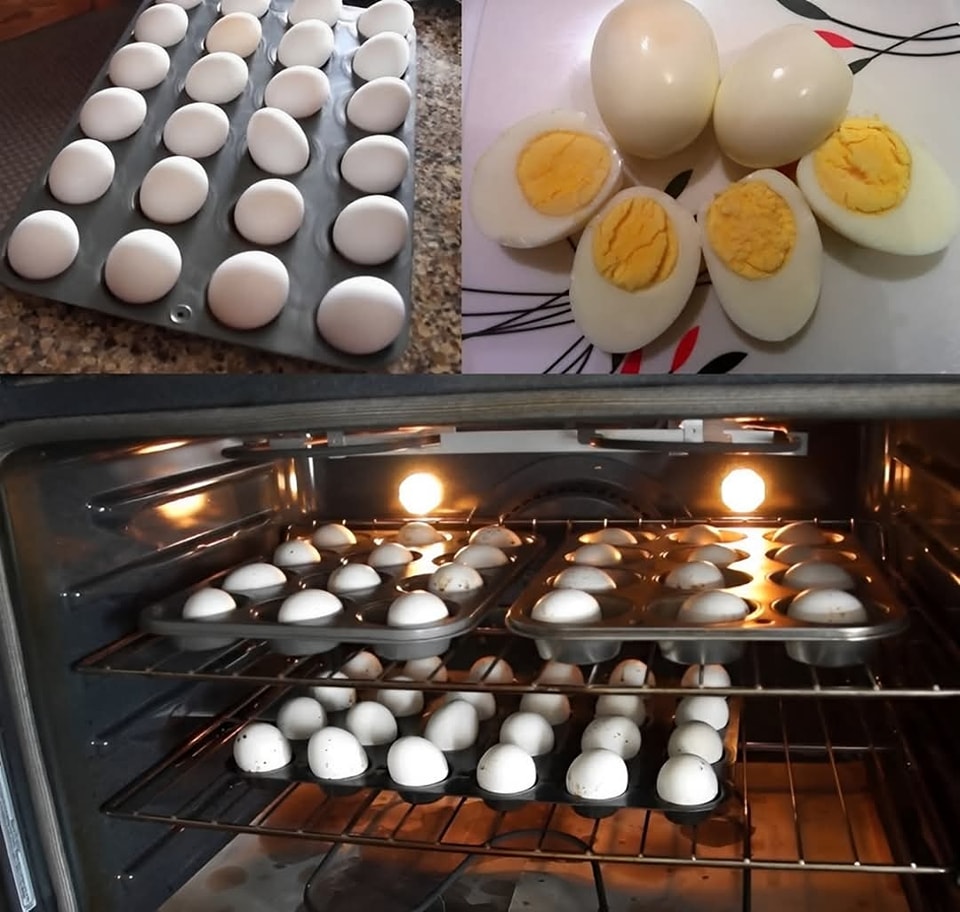If you’ve ever boiled eggs, you’ve probably dealt with all the usual annoyances—overboiled water spilling onto the stove, shells that refuse to peel, or that weird green ring around the yolk. That’s why the idea of baking hard-boiled eggs in the oven caught my attention. When I first heard about this method, I was skeptical.

I thought, “There’s no way that works.” But I’m always on the lookout for kitchen shortcuts that make life easier, so I gave it a try. And guess what? It actually works. The real question, though, is whether it’s better than the classic boiling method. Let’s break it down. First off, baking eggs in the oven is surprisingly simple. If you’ve never done it, don’t be intimidated. You don’t need to boil water, stand over a stove, or stress over a timer. All you need are eggs, a muffin tin or baking dish, and a bowl of ice water. You preheat your oven to somewhere between 325°F and 350°F, place the eggs in the muffin tin to keep them from rolling, and bake for 25 to 30 minutes. Once done, immediately transfer them to an ice bath for 5 to 10 minutes.
This halts the cooking and makes them easier to peel. From there, you can eat them right away or store them in the fridge—peeled eggs are best within three to four days, while unpeeled eggs can last up to a week. Now, let’s talk pros and cons. The main benefit of baking your eggs is that it’s hands-off. You don’t need to monitor a pot or worry about boiling water overflowing. It’s also perfect for making large batches. If you’re prepping for the week or making a tray of deviled eggs, you can cook a dozen or more all at once with minimal effort. Another perk is that some people find baked eggs easier to peel—although this is not always consistent.
On the flip side, there are some drawbacks. For starters, baking takes longer than boiling. While boiled eggs are ready in about 10 to 12 minutes, baking takes 25 to 30 minutes, plus cooling time. There’s also the issue of uneven cooking. Ovens don’t always heat evenly, so you may find that some eggs are slightly overcooked while others are still soft. Another thing to watch for is the occasional brown scorch mark on the shell, which looks strange but is harmless. Also, if you overbake them, the texture can get rubbery, and you risk getting that unattractive greenish-gray ring around the yolk.
That discoloration is caused by a reaction between sulfur in the whites and iron in the yolk, and it’s more likely if the temperature or timing isn’t quite right. As for taste, baked eggs are a bit different. The whites tend to be firmer, and the yolks can be slightly drier if you overcook them. It’s not a huge difference, but it’s noticeable if you’re picky about texture. The real issue most of us have with hard-boiled eggs is the peeling. Some people claim that baking makes eggs easier to peel, but here’s the truth: it’s not the method that matters most—it’s the age of the egg. Older eggs, whether baked or boiled, peel more easily. So if you want to save yourself some frustration, use eggs that are at least a few days old. And yes, shaking them in a container to loosen the shell does help, too. So, should you try baking your eggs? If you’re cooking for a crowd or want a hands-off method, the oven trick is worth trying. It’s great for meal prep or entertaining. But if you’re in a hurry or want consistently perfect eggs every time, boiling is still the winner. Personally, I stick with the stovetop method because it’s fast and familiar. But if I ever need to cook a mountain of eggs all at once, I’d happily go with the oven method. Either way, as long as the eggs turn out firm, flavorful, and easy to peel, you’re doing just fine. In the end, it’s not about which method is right—it’s about what works best for you and your kitchen routine





